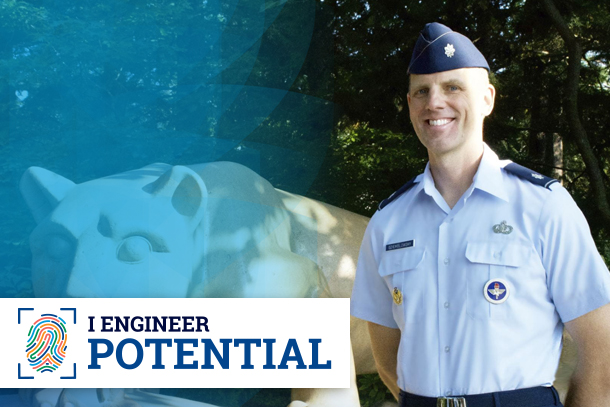
Thomas Oziemblowsky, a recently retired U.S. Air Force (USAF) lieutenant colonel, "engineers potential" as an academic adviser in the Engineering Advising Center. Provided by Thomas Oziemblowsky.
Thomas Oziemblowsky: ‘I Engineer Potential’
November 8, 2022
“I Engineer” highlights excellence across the Penn State College of Engineering, as well as how the college is made stronger by the diversity of perspectives, experiences and backgrounds of those in the engineering community.
UNIVERSITY PARK, Pa. — Thomas Oziemblowsky is an academic adviser in the Engineering Advising Center and a recently retired U.S. Air Force (USAF) lieutenant colonel. During his 22-year military career, Oziemblowsky served at the Pentagon as the executive assistant for the assistant secretary of the Air Force for manpower and reserve affairs, commanded units supporting thousands of personnel and managed a $20 billion training and equipping program while stationed overseas at the U.S. Embassy in Abu Dhabi, United Arab Emirates.
Oziemblowsky joined Penn State in 2019 as an assistant professor of aerospace studies and instructor for the Penn State Air Force Reserve Officer Training Corps, responsible for educating, training and motivating officer candidates for a diverse array of leadership positions. Upon retirement from the military in June 2022, Oziemblowky joined the College of Engineering as an academic adviser, helping engineering students fulfill their potential.
What initially drew you to the military?
I come from small town in Pennsylvania where my parents were a schoolteacher and a coal miner. Most of my family had served in the military, and after college, I decided I wanted to follow their path into the service. I joined the USAF after graduating from the Indiana University of Pennsylvania and was commissioned as an officer through the Officer Training School. I wanted to travel the world and experience adventure, and I did just that for over 22 years! I travelled to 20 countries, earned two graduate degrees paid for by USAF, served at the Pentagon and the U.S. Embassy in the United Arab Emirates and had the privilege to serve alongside the best and brightest of our nation in defense of our country.
What lessons did you learn in the military that you now pass on to engineering students?
The military taught me resilience in the face of adversity. Everyone experiences setbacks and, at times, fails — sometimes through no fault of their own. Oftentimes, we can’t control what happens to us, but we can control our response to our circumstances. It is how we respond to events in our lives that makes all the difference. Accepting our mistakes and moving on is an important part of recovery. So, don’t be afraid to fail. The only leaders who never fail are those who never takes risks to learn, grow and improve. It’s the same for students. If you don’t dare to do difficult things because they are hard, you will never reach your highest level of potential. Carpe diem! Reach high for your goals, and don’t be afraid to fail from time to time. The only time you truly fail is when you quit.
In the Engineering Advising Center, how do you “engineer potential”?
I love to help others reach their highest level of potential. I joined a great team of advisers who assist thousands of students as they navigate their first, second and third years of undergraduate academics at Penn State. We guide students’ academic planning, major and minor exploration, internships, study abroad and career opportunities. We plan and execute New Student Orientation, Accepted Student Programs, Spend a Summer Day, major exploration activities and group advising presentations. We are here to help students succeed, enabling their academic success from their first days of college to graduation and career entry.
What advice do you give those who are considering engineering?
The study of engineering is an excellent gateway to a student’s future. Graduation from Penn State with an engineering degree paves the way towards amazing careers that pay very well, including many opportunities with private companies, as well as public government opportunities such as the civil service and military. In fact, most of the officer trainees who commission as second lieutenants at Penn State get their degrees in engineering. That positions them well for success and for careers serving our country.
Anything else you’d like to share with those in the engineering community?
Engineers lead the way! You will be on the cutting-edge of scientific research and economic development. At Penn State, there are 14 majors those considering engineering can choose from. Just look to the amazing developments in space that we use every day, such as satellite-based internet, global positioning system and navigation, telecommunications and internet-based commerce and banking. We all use engineering marvels in our lives without a second thought, and it is the engineers of the future that will improve upon past generations to make life better for future ones! So, give your best, work and study hard and make us all proud when you walk the graduation stage at the end of your college journey. The world is waiting and needs you, and we applaud your efforts to be the best versions of yourself!



